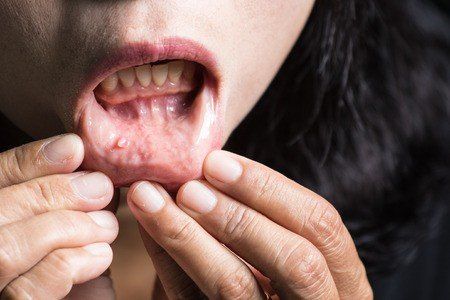How to Treat Mucositis
For those who haven’t heard of it, mucositis is a potential side effect of chemotherapy involving inflammation of tissues lining the interior of the mouth. According to the American Society of Clinical Oncology (ASCO), this condition occurs to roughly 40 percent of cancer patients undergoing chemotherapy. It's also among the most common chemotherapy side effects as well as the most painful. Luckily, for those who continually suffer from this condition during their cancer treatment, there are options available for treating mucositis.
When Mucositis Occurs
To treat cancer, patients who may benefit from it can undergo chemotherapy, which works by attacking cancer cells. However, chemotherapy drugs can attack a patient’s healthy cells as well if they happen to divide quickly as cancer cells do, per the National Institutes of Health. Cells that land in this category are those that line the mouth, meaning they can be targeted inadvertently by chemotherapy drugs and become vulnerable to infection or ulceration. Fortunately, mucositis can be avoided in some cases—the ASCO actually recommends that patients suck on ice before their treatment sessions and afterward, as this could protect the tissues. Also, an oral healthcare routine involving salt water rinsing may prevent mucositis or at least decrease the severity.
Mucositis Symptoms
This condition often appears between seven and ten days after a patient’s chemotherapy treatment has started. The mouth’s lining may become swollen, sore, and red, and sores could develop. The gums, tongue, or other tissues within the mouth could also become affected. When these symptoms are present, it can make the act of eating painful and the acts of talking or swallowing more difficult. In most cases, a dental professional can help their patients manage side effects, recommending home remedies and medications.
Home Remedies
Changes in diet could help you recover from mucositis, with acidic, dry, hot, salty, or spicy foods being likely to irritate sore tissues, which is why they should be avoided. Some foods that won’t irritate your mouth include puddings, milkshakes, noodles, and oatmeal. Pureeing other foods as well may make them simpler to eat. Additionally, your dental professional might suggest other home remedies, such as eating more protein, avoiding alcohol, and increasing fluid intake. If you use mouthwash that contains alcohol, you should change it out with an alcohol-free type to avoid further irritation.
Medications
If patients need more than just home remedies to alleviate discomfort, their dentist can prescribe medication to help relieve pain, such as a mouthwash with lidocaine. Topical anesthetics in spray or gel form could be prescribed as well to numb tender areas within the mouth. If it’s required, stronger pain medication, such as morphine, can be used. Either way, the mucositis should disappear between two and four weeks after chemotherapy finishes
If you showing symptoms of this condition, you may want to seek treatment from your dentist. If you would like to save as much as 20 percent off that visit, consider signing up for a New Hampshire discount dental plan. For more information on these plans for individuals, small business owners, and families, please click here.
Copyright: pongwit
/ 123RF Stock Photo











